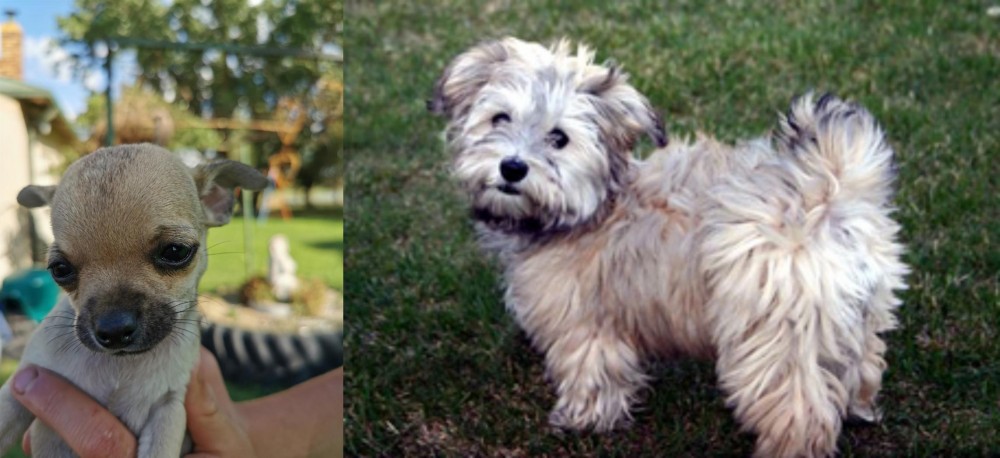 Chihuahua is originated from Mexico but Havapoo is originated from United States. Chihuahua may grow 15 cm / 5 inches shorter than Havapoo. Chihuahua may weigh 8 kg / 17 pounds lesser than Havapoo. Chihuahua may live 6 years more than Havapoo. Both Chihuahua and Havapoo has almost same litter size. Chihuahua requires Low Maintenance. But Havapoo requires Moderate Maintenance
Chihuahua is originated from Mexico but Havapoo is originated from United States. Chihuahua may grow 15 cm / 5 inches shorter than Havapoo. Chihuahua may weigh 8 kg / 17 pounds lesser than Havapoo. Chihuahua may live 6 years more than Havapoo. Both Chihuahua and Havapoo has almost same litter size. Chihuahua requires Low Maintenance. But Havapoo requires Moderate Maintenance
Basic Information
undefined
Mexico
United States
Life Span:
12 - 20 Years
10 - 14 Years
Other Names:
None
Poovanese, Island Mini Doodle, Havadoodle, Havanesepoo, Havanesedoodle
Colors Available:
Fawn, white and black, tan
brown, grey, tan, white, black
Coat:
Short- and long haired
soft, hypoallergenic fur
Shedding:
Moderate, Seasonal
Moderate
Temperament:
Affectionate, Alert, Cheerful, Courageous, Curious, Docile, Energetic, Friendly, Gentle, Independent, Intelligent, Lively, Loving, Loyal, Outgoing, Playful, Quiet, Responsive, Social, Sweet
Affectionate, Energetic, Friendly, Gentle, Intelligent, Loving, Outgoing, Playful
Grooming:
Low Maintenance
Moderate Maintenance
New Owners Friendly:
Yes
Yes
History
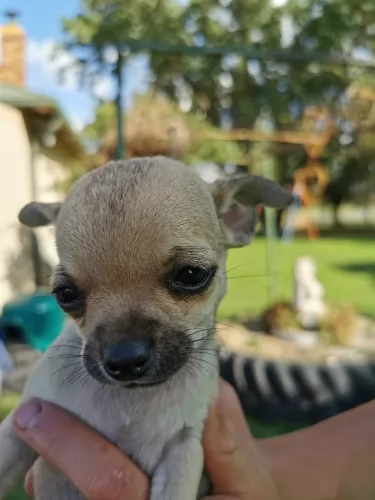 Quite a bit of the Chihuahua’s history is shrouded in mystery, and there are different versions about its origins.
Quite a bit of the Chihuahua’s history is shrouded in mystery, and there are different versions about its origins.
While historians speculate, most will agree that the tiny dog hails from Mexico. The UK Kennel Club considers the smooth- and long coat Chihuahuas as 2 distinct breeds.It was in 1904 that the Chihuahua became a registered breed by the American Kennel Club.
Chihuahua is actually the name of a state in Mexico, and it is amazing that Chihuahua specimens were found way back in the 1800's already. Today the Chihuahua is a very popular dog breed in several countries.
The Havapoo is usually a cross with a miniature Poodle and a Havanese but other poodle sizes such as the toy can be used. This is a fairly new cross breed just getting the attention of the American public. The result is a friendly, small dog. They have a striking appearance and lovable personality. They are easy to train and very smart. Not much is know about their heritage except that they were developed in the United States sometime in the past 30 years. Given the long history of the parental breeds, you can count on the quality and beauty of the Havapoo.
Description
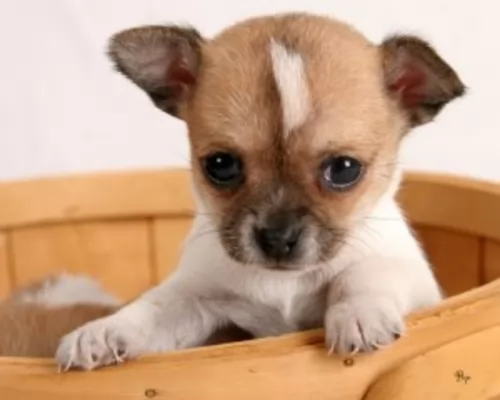 The small Chihuahua stands at about 15 – 23 cm and he weighs about 1,5 – 4kg.
The small Chihuahua stands at about 15 – 23 cm and he weighs about 1,5 – 4kg.
You’ll notice that he shivers when he is excited or when he is cold or frightened. Some people buy him a jersey to don on cooler days. With this tiny toy dog, you get a short- and a long coated Chihuahua.
This is the smallest dog breed and his coat is available in a number of colors such as fawn, tan, white and black. It is the dog’s round apple-shaped head which is a distinctive feature. He has erect ears and huge fruit-bat type eyes.
Temperament:
The Chihuahua is such an alert, fun-loving, feisty little dog, and though he may appear to be an ideal pet for children, he actually isn’t. He is too dainty and frail, and a child, during play, could accidentally crush him.
It’s a pity though because he just loves being around his human family. He is also a highly strung dog, and given the chance, he’ll nip and even bite during games. It is why socialization and training are considered important for the Chihuahua.
Just like with children, how you raise and treat your Chihuahua will determine how he turns out. He is such a sweet little dog that training and socialization can remove these unwanted characteristics. He is very intelligent and responds well to training.
The look of the Havapoo is unpredictable in first generation mixes as the puppies can appear like either of the parents. Most however have carried on the facial features of the Havanese. They usually have soft coats with hypoallergenic fur that comes in brown, black, grey, white and tan.
The white dogs tend to be deaf or perhaps even blind.
They are really good looking dogs whichever parent they favor.
Characteristics
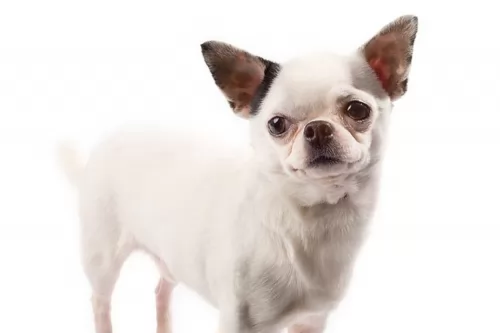 Small and feisty, the Chihuahua’s personality isn’t set in stone, and the tiny dog can be either shy and timid or he can be social, confident and jaunty.
Small and feisty, the Chihuahua’s personality isn’t set in stone, and the tiny dog can be either shy and timid or he can be social, confident and jaunty.
They're always loyal and affectionate to their human owners, but they don’t get on too well with- and are wary of small children who aren’t disciplined and who could hurt them.
With his big eyes and big ears together with his comical antics, they can be a source of entertainment for their human owners. He is easy to train too and even though he is small, he doesn’t think he is, and he is willing to use his big personality to make you a loving, loyal and devoted companion.
1Children friendliness yes but monitor their interaction so the dog does not get hurt.
2.Special talents highly intelligent and love to run
3.Adaptability Home or apartment is fine but would love a fenced yard to run in.
4.Learning ability very high smart and loves to learn
Health Problems
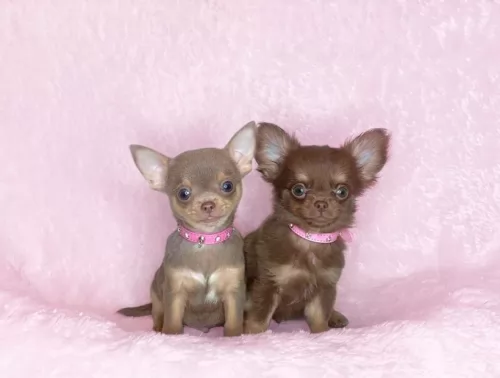 The Chihuahua doesn't have any particular health issues, more so when you get him from a reputable breeder. With good care he can reach 20 years of age.
The Chihuahua doesn't have any particular health issues, more so when you get him from a reputable breeder. With good care he can reach 20 years of age.
Hypoglycemia:
Known as low blood sugar, hypoglycemia is easily treatable, but if it isn’t caught early it can be fatal.Hypoglycemia makes a dog lethargic and he’ll shiver and could go into a coma. Get him to the vet immediately.
Bloat:
Gastric Dilatation or bloat is when the stomach twists, it becomes enlarged and blood supply is cut off to the stomach. Left untreated, it can be fatal.
Dental Disease:
Chihuahuas are susceptible to dental problems, so you will need to brush his teeth 2 or 3 times a week to prevent tartar build-up, gum disease, loss of teeth and other diseases.
Even though first generation mixes have no genetic health issues. There are however some issues they are prone to:
• Deafness - primarily in the white dogs, nothing can be done for it.
• Cataracts – can lead to blindness
• Hypothyroidism – can be medicated
• Hip Dysplasia – can lead to lameness
• Patellar Luxation – can lead to lameness
Caring The Pet
Diet:
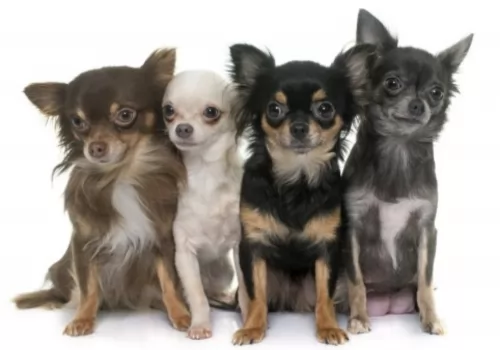 Always make sure to choose a high-quality dog food for your Chihuahua as this will keep him in tip-top health. A healthy Chihuahua can live to be 20 years of age. Speak to a veterinarian for recommendations on the best type of food to feed your tiny pet.
Always make sure to choose a high-quality dog food for your Chihuahua as this will keep him in tip-top health. A healthy Chihuahua can live to be 20 years of age. Speak to a veterinarian for recommendations on the best type of food to feed your tiny pet.
Giving him some home-made food such as brown rice, vegetables and cooked chicken for instance will be a welcome treat for him. Make sure he always has a bowl of fresh, cool water close by.
Exercise:
The Chihuahua may well be the smallest toy sized dog breed, but don’t be mistaken – he has plenty of energy and is constantly prancing around. He is more than capable of living in a small apartment, but even so he needs to be taken outside every now and then for a game or a walk.
Be careful with your small pet though, as too much exercise can lead to elbow- and hip dysplasia.
Grooming:
The Chihuahua is a moderate shedder with Spring being their heavier shedding period. Because of his small size, you won’t be bothered by too much hair. The short haired Chihuahua is easy to maintain and with a rubber brush, you can brush him gently twice a week.
You’ll also need to clip his nails and if you can’t manage this your vet can also help you.
1Feeding the puppy – feed a high quality puppy food for small or toy dogs. Feed 3-4 times a day a total or 1 cup.
2.Feeding the adult - feed a high quality puppy food for small or toy dogs. Feed 3-4 times a day a total of 2 cups
3.Points for Good Health – overall good health
4. Games and Exercises – needs some moderate exercise and would love a fenced yard to run in. Will play fetch and some are good at agility.
Comparison with other breeds
- Chihuahua vs English Bulldog - Breed Comparison
- Chihuahua vs German Shepherd - Breed Comparison
- Chihuahua vs Golden Retriever - Breed Comparison
- Chihuahua vs Labrador Retriever - Breed Comparison
- Chihuahua vs West Highland White Terrier - Breed Comparison
- Chihuahua vs French Bulldog - Breed Comparison
- Chihuahua vs Beagle - Breed Comparison
- Chihuahua vs Yorkshire Terrier - Breed Comparison
- Chihuahua vs Poodle - Breed Comparison
- Chihuahua vs Rottweiler - Breed Comparison
- Chihuahua vs Boxer - Breed Comparison
- Chihuahua vs English Pointer - Breed Comparison
- Chihuahua vs Siberian Husky - Breed Comparison
- Chihuahua vs Doberman Pinscher - Breed Comparison
- Chihuahua vs American Bully - Breed Comparison
- Chihuahua vs Abruzzenhund - Breed Comparison
- Chihuahua vs Affenpinscher - Breed Comparison
- Chihuahua vs Afghan Hound - Breed Comparison
- Chihuahua vs Aidi - Breed Comparison
- Chihuahua vs Airedale Terrier - Breed Comparison
- Chihuahua vs Akbash Dog - Breed Comparison
- Chihuahua vs Akita - Breed Comparison
- Chihuahua vs Africanis - Breed Comparison
- Chihuahua vs Askal - Breed Comparison
- Chihuahua vs Atlas Terrier - Breed Comparison
- Havapoo vs English Bulldog - Breed Comparison
- Havapoo vs German Shepherd - Breed Comparison
- Havapoo vs Golden Retriever - Breed Comparison
- Havapoo vs Labrador Retriever - Breed Comparison
- Havapoo vs West Highland White Terrier - Breed Comparison
- Havapoo vs French Bulldog - Breed Comparison
- Havapoo vs Beagle - Breed Comparison
- Havapoo vs Yorkshire Terrier - Breed Comparison
- Havapoo vs Poodle - Breed Comparison
- Havapoo vs Rottweiler - Breed Comparison
- Havapoo vs Boxer - Breed Comparison
- Havapoo vs English Pointer - Breed Comparison
- Havapoo vs Siberian Husky - Breed Comparison
- Havapoo vs Doberman Pinscher - Breed Comparison
- Havapoo vs American Bully - Breed Comparison
- Havapoo vs Abruzzenhund - Breed Comparison
- Havapoo vs Affenpinscher - Breed Comparison
- Havapoo vs Afghan Hound - Breed Comparison
- Havapoo vs Aidi - Breed Comparison
- Havapoo vs Airedale Terrier - Breed Comparison
- Havapoo vs Akbash Dog - Breed Comparison
- Havapoo vs Akita - Breed Comparison
- Havapoo vs Africanis - Breed Comparison
- Havapoo vs Askal - Breed Comparison
- Havapoo vs Atlas Terrier - Breed Comparison
 Petzlover
Petzlover Chihuahua is originated from Mexico but Havapoo is originated from United States. Chihuahua may grow 15 cm / 5 inches shorter than Havapoo. Chihuahua may weigh 8 kg / 17 pounds lesser than Havapoo. Chihuahua may live 6 years more than Havapoo. Both Chihuahua and Havapoo has almost same litter size. Chihuahua requires Low Maintenance. But Havapoo requires Moderate Maintenance
Chihuahua is originated from Mexico but Havapoo is originated from United States. Chihuahua may grow 15 cm / 5 inches shorter than Havapoo. Chihuahua may weigh 8 kg / 17 pounds lesser than Havapoo. Chihuahua may live 6 years more than Havapoo. Both Chihuahua and Havapoo has almost same litter size. Chihuahua requires Low Maintenance. But Havapoo requires Moderate Maintenance Quite a bit of the Chihuahua’s history is shrouded in mystery, and there are different versions about its origins.
Quite a bit of the Chihuahua’s history is shrouded in mystery, and there are different versions about its origins. The small Chihuahua stands at about 15 – 23 cm and he weighs about 1,5 – 4kg.
The small Chihuahua stands at about 15 – 23 cm and he weighs about 1,5 – 4kg. Small and feisty, the Chihuahua’s personality isn’t set in stone, and the tiny dog can be either shy and timid or he can be social, confident and jaunty.
Small and feisty, the Chihuahua’s personality isn’t set in stone, and the tiny dog can be either shy and timid or he can be social, confident and jaunty. The Chihuahua doesn't have any particular health issues, more so when you get him from a reputable breeder. With good care he can reach 20 years of age.
The Chihuahua doesn't have any particular health issues, more so when you get him from a reputable breeder. With good care he can reach 20 years of age. Always make sure to choose a high-quality dog food for your Chihuahua as this will keep him in tip-top health. A healthy Chihuahua can live to be 20 years of age. Speak to a veterinarian for recommendations on the best type of food to feed your tiny pet.
Always make sure to choose a high-quality dog food for your Chihuahua as this will keep him in tip-top health. A healthy Chihuahua can live to be 20 years of age. Speak to a veterinarian for recommendations on the best type of food to feed your tiny pet.